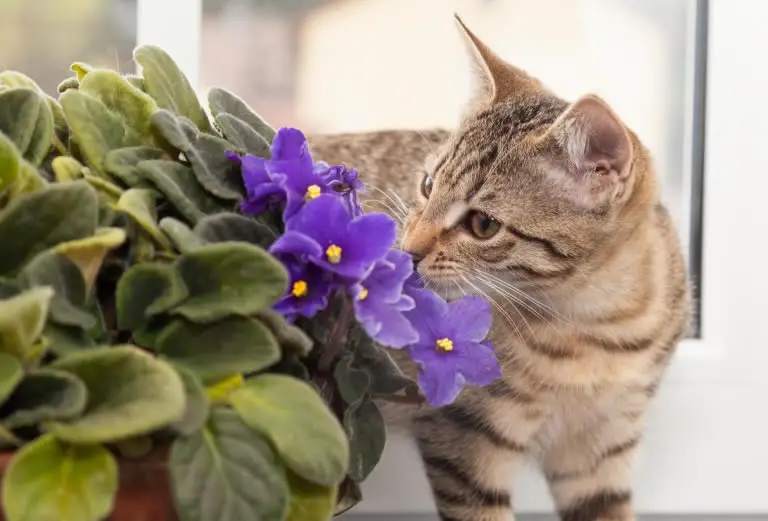In this article I cover whether african violets are toxic to people and animals. Obviously as african violet is a popular houseplant it becomes of interest to houseplant owners who have kids in their house and/or curious pets. So let’s get to it.
Table of Contents
Are african violets poisonous?
African violet is a tropical plant that is native to parts of Africa.
These beautiful colorful plants make fantastic easy-care houseplants as most homes maintain the type of warm humid atmosphere perfect for these beautiful flowering perennials, but are they poisonous?
African violets are not poisonous to kids and to most common pets.
They are not poisonous to touch and are non-toxic if eaten by humans and the majority of pets.
They can be poisonous to rabbits and goats if ingested however.
For most houseplant owners their main concern about growing plants that are potentially poisonous is the negative effects that may be caused through ingestion.
Houseplant lovers often unknowingly grow poisonous plants in homes where young children and curious pets live or visit.
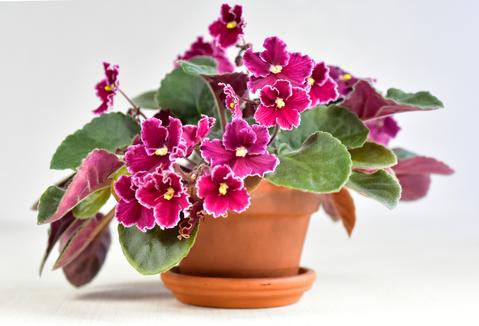
When it come sto toxic houseplants young children and curious pets can fall ill by nibbling on the plant foliage.
So it is always something to consider when planning out which houseplants you intend to grow when you have pets and children in your home.
So, first let’s see if african violets are poisonous and dangerous if ingested by humans and then we’ll look to see if they are poisonous to common household pets.
African violets are non-toxic to humans
Obviously your average adult will not go round munching on houseplant foliage but that may not be the case for small children.
At an early age kids are curious about the world and will easily satisfy their curiosity about how your houseplants taste by nibbling on them.
So, if you have kids in your home you will want to know if african violets are toxic to human beings.
Are african violets poisonous to humans?
African violets are not poisonous to humans. Touching african violets will have no negative effect on a human.
If ingested, african violets still remain non-toxic to human beings of all ages.
So rest easy that you can safely grow african violets in your home, (or garden if you have the correct climate).
Even if a curious child decides they want to know what those lovely green leaves or colorful blooms taste like, they will not be harmed in any way.
African violets are safe for humans but what about your pets?
Let’s take a look at the most common pets to see if african violets are toxic to them.
African violets are not poisonous to cats
Cats are a very popular pet (and I have 5 of them). Anyone who owns a cat may be concerned that if they grow an african violet and their precious pussy starts to eat it will the cat fall ill.
African violets are not poisonous to cats.
Cats can come into physical contact with african violets, by rubbing up against them for example, and they will experience no ill-effects.
Although it is not a good idea not to let your cat nibble on your african violet plants, the animal will suffer no negative effects from eating it either.
Cats will often eat foliage from plants as it acts as a natural source of fiber.
Eating both grass and plant foliage can help a cat to move hairballs through it’s system for elimination.
Hairballs can be dangerous to cats and cause some nasty symptoms and problems if they are not removed.
Although felines will cough up furballs (usually on the carpet or some other inconvenient place – at least in my experience) they also pass them through their system when they use the litter tray.
Fiber, in the form of plant foliage and grass, helps them do this.
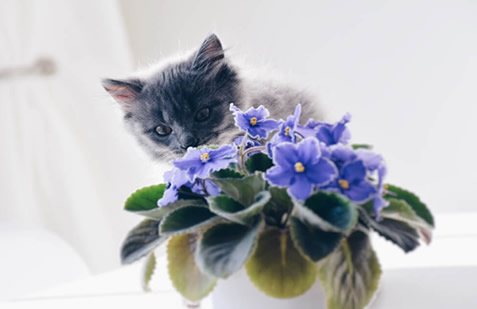
Unfortunately, unlike many other houseplants, cats seem to enjoy the taste of african violet.
Although your cat will suffer no negative effects from eating the foliage from an african violet you may want to keep your plant away from your feline friend to keep your plant and its leaves in good shape.
African violets are non-poisonous to dogs
Ok, so your feline friends are completely safe around african violets, but what about your beloved dogs … are african violets poisonous to dogs?
African violets are not poisonous to dogs.
If a dog comes into physical contact with african violet the plant will no effect on the animal.
African violet is also non-toxic to dogs.
However, in some cases eating the foliage may cause a tummy upset or even diarrhea, though this is rare.
Dogs are the most popular pet in the US and so it is no wonder houseplant owners would be concerned about the safety of their animal around their indoor plants.
As I pointed out above, just as it is with cats (the second most popular pet in the US) african violets are non-toxic to dogs.
This does not mean you should be unconcerned about your dog chewing on your Saintpaulia (african violet) however!
In rare cases a dog may experience a tummy upset or even temporary diarrhea if it consumes african violet, or any other houseplant for that matter.
So it is best to ensure your dog has no access to your plant or is clearly trained to know it should not touch it (good luck achieving that with your cat).
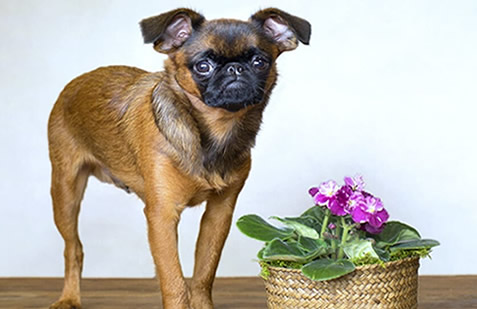
The good news is that dogs are much less likely to eat your plants than cats are, but they will still nibble on foliage for the same reasons.
Plant foliage, and grass, act as a great source of natural fiber for animals.
If your dog does eat some of your african violet, either the leaves or the flowers, it will suffer no long-term ill-effects.
African violets can be poisonous to rabbits
Rabbits can safely eat violets but as I pointed out here african violets are not actually violets and only get their name from their superficial resemblance to violets.
So although rabbits can feed on violets safely, can they eat african violets?
African violets may be poisonous to rabbits.
Violets are safe for rabbits but african violets are not actually violets and may be toxic to rabbits.
There is very little information available on the level of toxicity african violets have for rabbits.
So to be safe it is best to just make sure your rabbit never eats any of the plant. Prevention is better than cure!
There is not a lot of research available on the toxicity of african violets as far as rabbits are concerned.
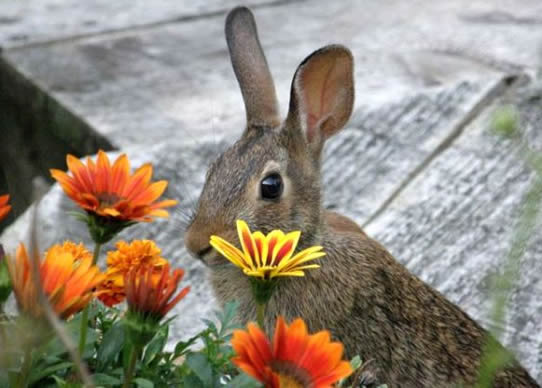
It is therefore best to err on the side of caution and just make sure your rabbit is never given access to your african violet plants.
From what little information there is available, it seems that rabbits are not very fond of the taste of african violet foliage. Hence there is no experiential evidence from rabbit owners of the levels of toxicity that african violet may have for rabbits.
There is no scientific studies into this either at the time of writing this article.
African violets are non-poisonous to birds so they’re safe for the garden
Although birds that are kept as pets will be caged (as a vegan my heart breaks over this) garden african violets are up for grabs as far as wild birds are concerned.
Although a wild bird would prefer a tasty berry, a garden worm or a new flower bud as a treat, it is not beyond the realm of possibility to assume that it would peck at your garden african violets.
So should you be concerned if the plant is toxic to birds?
African violets are not poisonous to birds.
African violets are completely non-toxic to birds and ingesting them will have no ill-effect on any kind of avian animal.
So rest assured, if you live in a climate that can sustain african violet outdoor growth then birds are not in danger from eating the plant.
If you enjoyed this article and want to know more about cultivating and growing african violets be sure to check out the african violet light requirements article and the article about african violet soil so you get the most benefit from your efforts.

